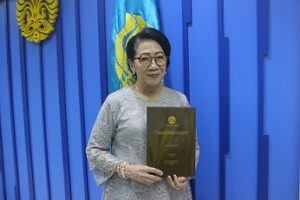
DEVELOPMENTAL TRAUMA AND MEANING MAKING MODEL ARE WAYS TO REHABILITATE PEOPLE WITH DRUG ADDICTION
Drug addiction and its recovery are complex symptoms and involve a range of behaviors, starting from the function and molecular structure of the brain’s physiology, psychological functions, psychosocial environment, and social and cultural relations. Drug addiction is characterized by chronic relapses, requiring several episodes of treatment for years before recovery is completed.
According to Tri Iswardani, in her research entitled “Pemulihan Adiksi Narkoba dalam Perspektif Trauma Perkembangan dan Model Meaning Making” (Rehabilitation of Drug Addicts in the Perspective of Developmental Trauma and the Meaning Making Model), the process of recovering from drug addiction does not stop when a person stops using drugs but continues throughout his or her life. Therefore, appropriate steps are needed to rehabilitate people with drug addiction. By integrating Developmental Trauma and Humanistic-Existential perspectives, Tri hopes that the results of her research can provide input and consideration for stakeholders in evaluating and perfecting drug addiction therapy and rehabilitation programs.
Tri’s research was divided into two stages. First, Study 1 with quantitative analysis applying the Adverse Childhood Experience (ACE) questionnaire, Beck’s Depression Inventory-II (BDI-II), Meaning in Life Questionnaire (MLQ), and Drug Addiction Screening Test-20 (DAST-20). Study 1 involved 251 participants in rehab, aged 18-58 years who were undergoing rehabilitation or had completed a rehabilitation program, and who were domiciled in the areas of Jakarta, Bogor, Depok, Tangerang, and Bekasi (Jabodetabek).
From the participants in Study 1, Tri chose a number of participants for Study 2 based on several criteria, namely having stopped using drugs (recovering addicts) for at least 3 years; expressing willingness to undergo in-depth interviews regarding addiction experiences; and stating that they were able and willing to participate in the research until it was completed. From this process, 9 potential participants were obtained who were willing to take part in the initial 40–60 minute interview. Then 5 participants committed to participating in the research to completion were selected.
In Study 2, a qualitative case study was conducted by performing semi-structured interviews with 5 recovering addicts aged 24–49 years. Interviews were conducted individually with a total time of 3-6 hours divided into 2-3 meetings for each participant. The results of the interviews were analyzed to find essential themes related to Developmental Trauma and the Meaning Making Model.
The Structural Equation Model (SEM) analysis carried out shows a conceptual model regarding the relationship between Adverse Childhood Experience, depression, meaning in life, and drug addiction in accordance with empirical data. Meaning of Life Presence significantly mediates the relationship between Adverse Childhood Experience and drug addiction. Meaning making is an ongoing process before and during drug use and recovery. The Meaning Making model can explain all phenomena of drug addiction through development and recovery paths.
The process of meaning making in the rehabilitation of drug addicts with a background of developmental trauma takes place automatically. It means when traumatic events experienced in childhood form global beliefs, global feelings, and global goals that cause distress, and lead to vulnerability to use drugs. Accumulation of problems due to developmental trauma and crisis problems due to drug use can result in participants experiencing a downturn and depression. This condition has the opportunity to become a turning point to change non-constructive meanings into new constructive meanings.
Tri added that depressive symptoms can lead individuals to new meaning making and beliefs to replace the previous ones. Based on these results, the application of meaning therapy and Trauma-Informed Care (TIC) in rehabilitation programs can be recommended. “The results of this study can be used as a consideration for implementing a trauma-informed approach in the delivery of drug addiction rehabilitation services. Specific skills training on trauma healing is recommended to increase the expertise of counselors in dealing with trauma-based addiction,” said Tri, who is a Clinical Psychologist specializing in trauma and addiction rehabilitation.
In addition, Tri said that the risk of re-traumatization and secondary trauma on counselors in guiding drug addiction clients also needs to be considered, especially for those with a background of developmental trauma (trauma-based addiction). This is because most of the counselors in rehabilitation centers based on the Therapeutic Community program are former drug addicts. This is also an effort to improve the welfare of counselors.

Through this dissertation, Tri Iswardani successfully earned her doctoral degree from the Faculty of Psychology, Universitas Indonesia (UI). At the Doctoral Promotion Session held Friday (16/12), in the Hall of the Faculty of Psychology UI, Tri Iswardani became the 169th doctor from Psychology Doctoral Program with the title of Exceptional Satisfactory.
The session was chaired directly by Dean of the Faculty of Psychology UI Dr. Bagus Takwin, M.Hum., Psikolog, with Promoter: Dra. Winarini Wilman, M.Ed.St., Ph.D., Psikolog and Co-promoter: Prof. Irwanto, Ph.D., Psikolog. The examiner board was chaired by Prof. Dr. Elizabeth Kristi Poerwandari M.Hum., Psikolog with other members: Dra. Riza Sarasvita, M.Si., MHS., Ph.D., Psikolog; Dr. Adriana Soekandar Ginanjar, M.S., Psikolog; and Dr. Sri Redatin Retno Pudjiati, M.Si., Psikolog.



